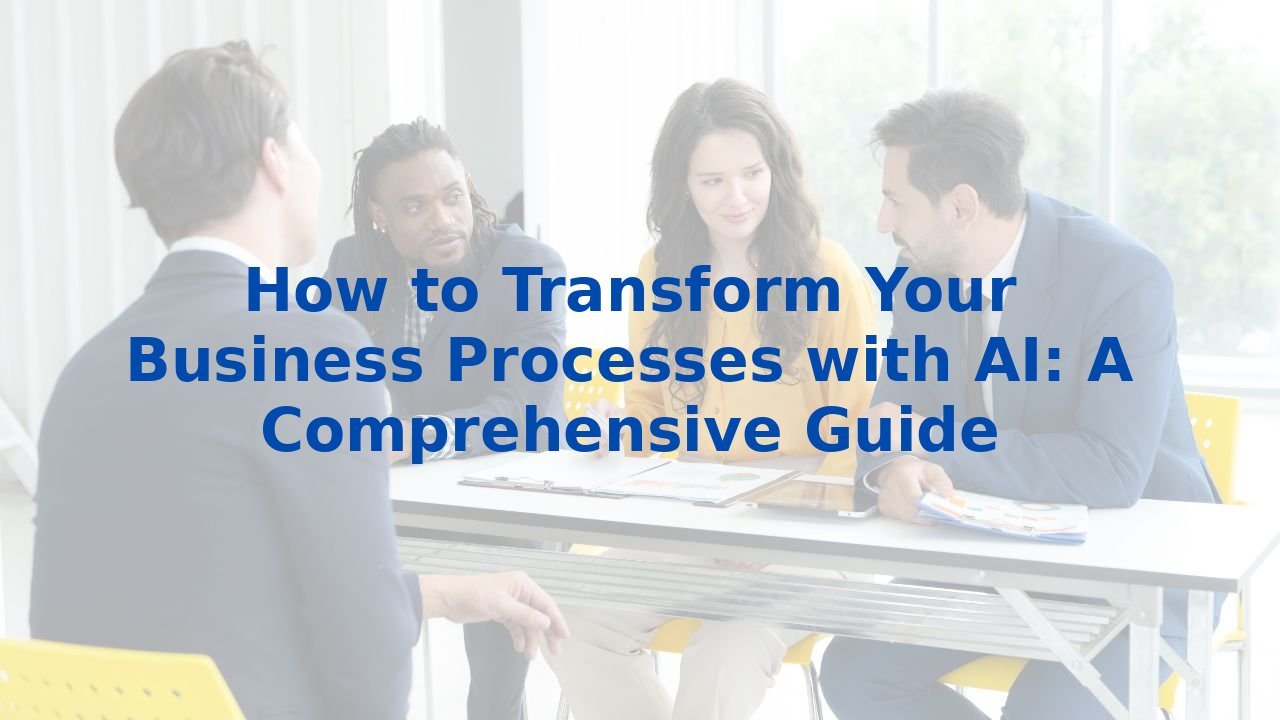How to Transform Your Business Processes with AI: A Comprehensive Guide
How to Transform Your Business Processes with AI: A Comprehensive Guide
In the relentless march of technological advancement, businesses are tasked with not only keeping up but redefining their operational landscape. Enter artificial intelligence (AI) — a transformative force that redefines how organizations approach their processes. Its integration into Business Process Management (BPM) stands as a beacon for those seeking efficiency, adaptability, and long-term success.
Understanding Business Process Management
At its core, Business Process Management is the structured approach to optimizing an organization’s operations. It involves a threefold process: designing workflows, executing them, and monitoring outcomes. Traditionally, this has relied heavily on manual efforts, susceptible to inaccuracies and delays. The disruption caused by AI paves a path to enhancing BPM through automation, refined analytics, and strategic reconfiguration of processes.
How AI Enhances Business Processes
The value of AI in BPM can be distilled into three primary elements: data analysis, process building, and automation. Each of these elements contributes to a smoother, more efficient operational flow that can significantly impact an organization’s bottom line.
Data Analysis
The sheer volume of data available today can be overwhelming. AI excels at sifting through this information rapidly and efficiently, unveiling insights that would take humans hours or even days to discern. Imagine your management team quickly understanding customer preferences, market dynamics, and operational bottlenecks, all thanks to AI-driven analytics! This transforms data from a passive asset into a proactive decision-making tool that guides the direction of the business.
Process Building
Building processes from scratch can often be cumbersome and laden with challenges. AI simplifies this by constructing workflows tailored to specific organizational needs. Once programmed with the necessary parameters, AI can leverage historical data to recommend the most effective process configurations. This nimbleness allows businesses to pivot quickly in response to market fluctuations or internal necessities.
Automation
Perhaps the most celebrated aspect of AI is its ability to automate tasks that previously demanded human effort. From data entry to customer inquiries, automating these repetitive tasks liberates employees to engage in higher-order thinking and innovation. Picture a world where your team can focus on strategic initiatives rather than rote activities; that’s the future AI promises!
Specific Applications of AI in Business Processes
AI’s impact is far-reaching, influencing diverse domains within business operations. Here are a few areas where AI proves transformative:
Sales and Marketing
The intersection of AI and sales/marketing unleashes insights derived from customer data. By analyzing patterns, AI can identify potential high-value customers and suggest personalized engagement strategies. Additionally, AI-powered chatbots not only streamline communication but also enrich the buyer’s journey through tailored experiences.
Customer Service
Imagine a customer service landscape where simple queries are automatically handled by AI, allowing human agents to address complex concerns. AI's ability to evaluate service calls ensures higher standards of customer interaction. This not only enhances customer satisfaction but also refines the service delivery model.
Human Resources
In HR, AI plays a crucial role in both recruitment and employee management. By utilizing data-driven insights, AI can improve the selection process, ensuring candidates are better matched to organizational needs. Moreover, it can assist in nuanced negotiations such as salary discussions, fostering an equitable work environment.
Benefits of Training Employees for AI
As AI reshapes the workplace, it becomes critical to empower your workforce. Training employees to effectively collaborate with AI brings immense value:
Enhanced Collaboration
Employees equipped with AI knowledge can seamlessly integrate technology into their daily tasks, leading to improved collaboration between human intelligence and artificial intelligence.
Improved Decision-Making
Trained employees can harness AI insights for strategic decision-making. A workforce that comprehends data analytics is one poised for success, ensuring decisions resonate with the organization's overarching goals.
Adaptability
In a rapidly changing landscape, adaptability is key. Employees who understand AI are more likely to embrace new technologies, allowing organizations to pivot swiftly to retain competitiveness.
Reduced Errors
Familiarity with AI systems means fewer mistakes and smoother operations. By understanding the tools at their disposal, employees can navigate the complexities of AI, enhancing overall organizational efficiency.
Conclusion
The integration of AI into business processes is not merely about automation; it is a strategic overhaul that rethinks how organizations operate. By enhancing data analysis, streamlining process building, and promoting automation, AI emerges as a cornerstone for achieving operational excellence.
Yet, the journey doesn’t end with technology adoption. Training employees to harness AI’s full potential is vital. As organizations embrace AI, creating a culture of learning will not only drive success but ensure sustainability in an ever-evolving marketplace.
In embracing AI, organizations are not just investing in a tool; they are investing in a vision — one where efficiency is maximized, decisions are data-driven, and the future is within reach.



